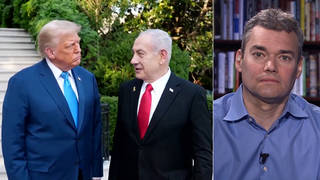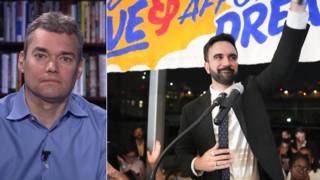
Topics
Guests
- Mona El SeifEgyptian activist who was interviewed outside the parliament building in Cairo.
- Sharif Abdel KouddousDemocracy Now! senior producer. He is currently reporting from Cairo, Egypt.
Egypt’s pro-democracy uprising is seizing new momentum one day after hundreds of thousands turned out for one of the largest protests in Cairo’s Tahrir Square to date. A gathering of protesters led to the evacuation of the Egyptian cabinet building today, and tent camps are also being set up outside the Egyptian parliament. Egypt’s labor movement has launched new strikes across the country, with an estimated 10,000 workers taking part. Democracy Now! senior producer Sharif Abdel Kouddous interviews a demonstrator outside the Egyptian parliament building. [includes rush transcript]
Transcript
AMY GOODMAN: The pro-democracy protests in Egypt appear to be growing across the country. More than 10,000 workers have gone on strike in the past 24 hours, including thousands of service workers at the Suez Canal. In Cairo, the Egyptian cabinet building has been evacuated after protesters began gathering outside and set up camp there. For the first time, pro-democracy protesters camping outside the Egyptian parliament building are calling for the immediate dissolution of the lower house, known as the People’s Assembly.
Democracy Now! senior producer Sharif Abdel Kouddous spoke with Mona El Seif, one of the protesters gathered outside the parliament.
MONA EL SEIF: I’m Mona El Seif. I do not belong to any party. I’m just like an activist mainly through blogging and Twitter, social networks. I came to Tahrir a couple of hours ago, and Tahrir was completely filled with people. I’ve been here since the beginning, and I have never seen that amount of people filling Tahrir Square. Everyone with their families and everything, it’s like all of Egypt was really heading towards Tahrir. And then I got a tweet saying that people were heading to the People’s Assembly building, so I sent it out to others and called others to join us, and then I headed toward the People’s Assembly building, where we are right now. And just spontaneously, people started marching in the street and chanting about the legitimacy of the People’s Assembly and the parliament. And suddenly we were hundreds walking in the streets towards where we are right now. And basically there are two groups here: one next to this gate and another one on the other gate on the other side. And they decided they are going to stage a sit-in and not leave here. So this is sort of an extension to the Tahrir Square demonstration.
SHARIF ABDEL KOUDDOUS: What’s the significance of the People’s Assembly?
MONA EL SEIF: Well, the People’s Assembly is supposedly representing us to the government. But last elections were a total joke. I think the NDP won something like 97 percent of all the assembly, so it was like there were horrific stories about forgery and about buying people’s voices and about burning out voices. Like, it was awful. So, really, our demands for this, for all of us, happening, the first was for Mubarak to step down, the second was for the parliament to also be removed of any power. So we are here. This is very symbolic, and this is very powerful. Also, January 25th, we had one of the most violent battles with the police right over there in the street. Many of us were wounded. It was really awful. So, for us, it’s very powerful to win back the street and to spread on it and to feel that it’s really ours.
SHARIF ABDEL KOUDDOUS: Do you feel public opinion is shifting in support of the protesters?
MONA EL SEIF: Absolutely. We’ve lost a lot of public opinion after Mubarak’s — [inaudible] the speech of Mubarak. But then, the next day there was the bloody Wednesday, where Mubarak’s thugs were released and [inaudible] with bullets and Molotov cocktails. And a lot of people died that day, and we won a bit of the public opinion back.
But I think the turning point was yesterday, when Wael Ghonim, who was the admin of Khaled Said’s page on Facebook and who was the first to call for this demo, was released after 12 days of being arrested. And he was on national TV on a very important show on national TV, and he was so genuine. He was absolutely genuine, and you could see how sincere he was in this call, and it was just for Egypt. He had no hidden agendas. So, I think this interview really was the turning point, and today is really evidence of it. I have never seen Tahrir Square so full of people like that. People who usually do not call for others to join the protests have been sending out messages and bringing their children, their families, and coming to Tahrir Square. So, definitely his interview yesterday was a turning point.
SHARIF ABDEL KOUDDOUS: So, you have Tahrir Square. Now you have the streets with Majilis Al-Sha’ab, the People’s Assembly building. What’s going to happen next?
MONA EL SEIF: We don’t know, but we keep on building up the pressure. Either he’s going to leave, or we just win back Egypt bit by bit, as we are doing right now.
SHARIF ABDEL KOUDDOUS: Thank you very much.
MONA EL SEIF: Thank you.
AMY GOODMAN: That was Mona El Seif, one of the protesters. Thousands gathered in front of the parliament for the first time. They marched there from Tahrir Square yesterday.













Media Options